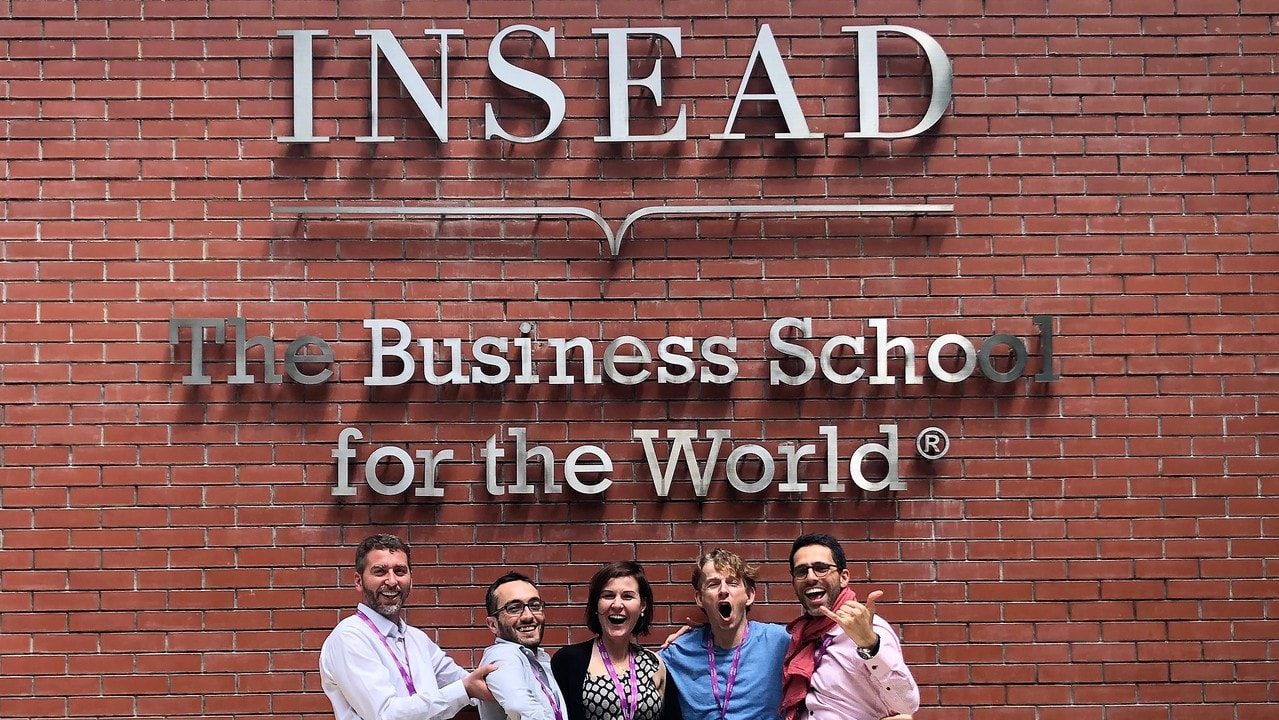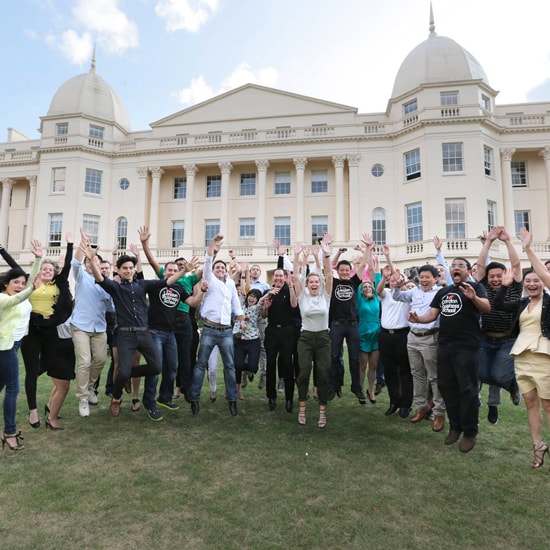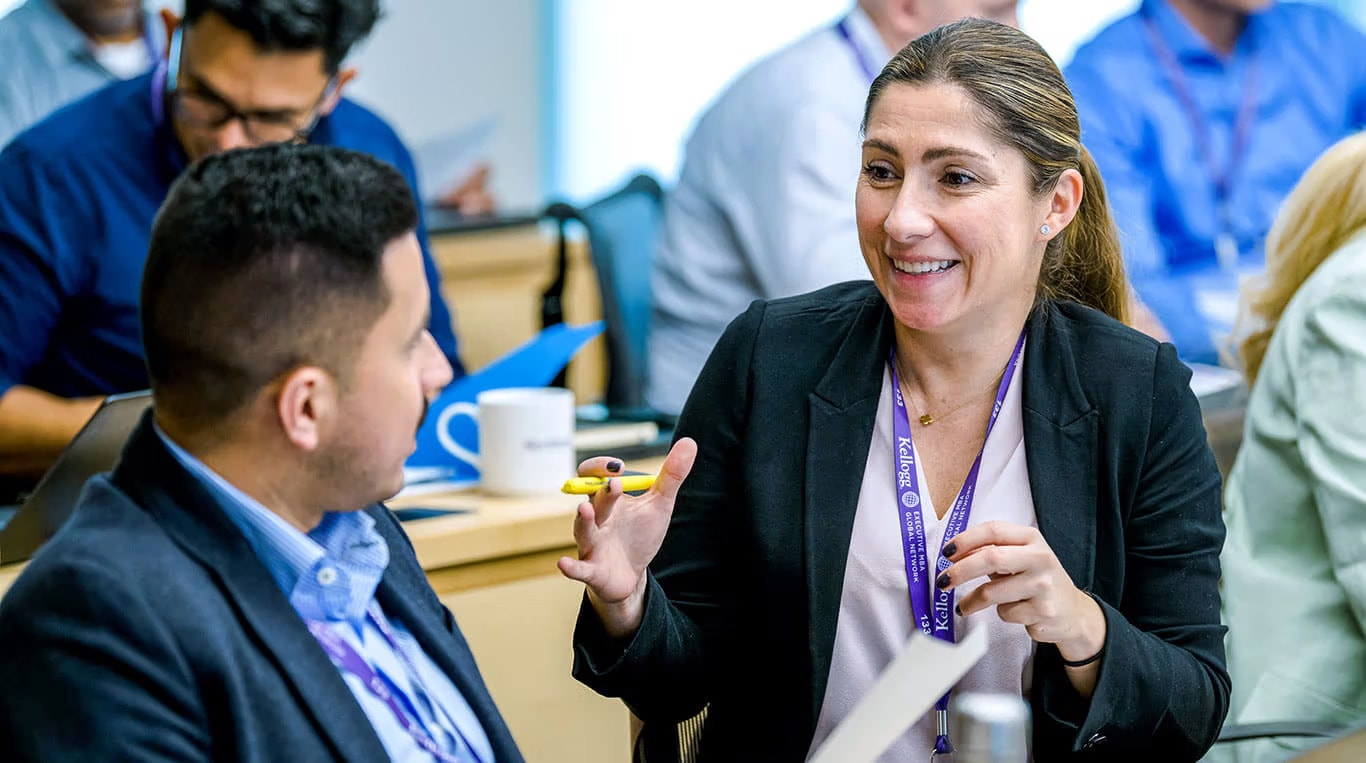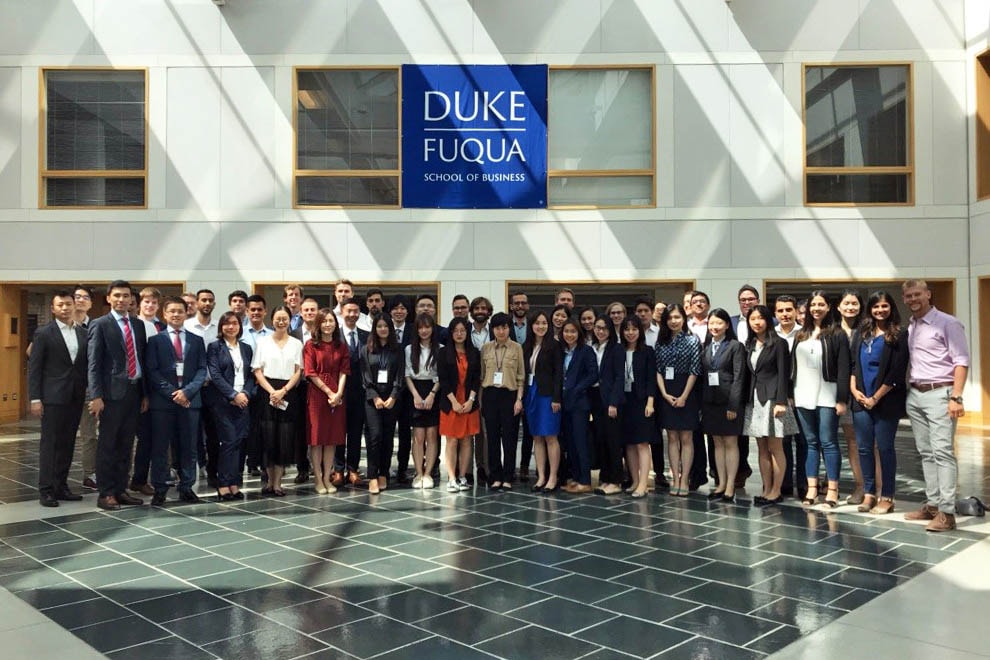Image by katemangostar on Freepik
In today’s dynamic business world, experienced professionals constantly seek ways to climb up their careers without putting their professional lives on hold.
Enter the Executive Masters in Business Administration (EMBA) – a powerful catalyst for career advancement that allows ambitious individuals to enhance their skills, expand their networks, and accelerate their growth while continuing to work.
As we look ahead to 2024, the landscape of executive education continues to evolve, adapting to the changing needs of global business leaders.
Executive MBA programs have long been the go-to choice for seasoned professionals looking to take their careers to the next level.
These programs are meticulously designed to cater to the unique needs of working professionals, offering flexible schedules and curricula that can be immediately applied to real-world business challenges.
What is an Executive MBA?
An Executive MBA is a graduate-level business degree designed specifically for experienced professionals who wish to enhance their management skills and business acumen while continuing to work full-time.
Unlike traditional MBA programs, EMBAs cater to students with significant work experience, typically requiring a minimum of 5-10 years in managerial roles.
Key characteristics include:
1. Flexible schedules: Classes are often held on weekends or in intensive modules to accommodate working professionals.
2. Experienced cohorts: Students learn alongside peers with diverse industry backgrounds and substantial work experience.
3. Applied learning: Curricula focus on real-world applications, allowing students to immediately implement their learnings in their current roles.
4. Leadership and professional development: Strong emphasis on developing strategic leadership and management skills.
5. Global perspective: Many programs include international business components or global operations management supply chain management courses.
The primary difference between an Executive MBA and a traditional MBA program lies in the target audience and program structure.
While traditional MBA programs are geared towards early-career professionals or recent graduates, EMBAs are tailored for experienced professionals looking to advance to senior leadership positions or pivot their careers.
Benefits of Pursuing an Executive MBA
Embarking on an Executive MBA journey offers numerous advantages for ambitious professionals:
1. Career advancement opportunities: EMBA graduates often see significant career progression, with many moving into C-suite or senior executive roles within a few years of completing the program.
2. Networking with high-level professionals: EMBA cohorts consist of accomplished professionals from diverse industries, providing invaluable networking opportunities that can lead to new business ventures, partnerships, or career opportunities.
3. Immediate application of learning: The practical nature of EMBA curricula allows students to apply new concepts and strategies directly to their current work environments, delivering immediate value to their organizations.
4. Enhanced leadership skills: Executive MBA programs focus heavily on developing strategic thinking, decision-making, and leadership capabilities, preparing graduates for top-tier management roles.
5. Global business perspective: Many programs offer international experiences, helping students develop a broader understanding of global business practices and cross-cultural management.
6. Personal growth and confidence: The rigorous nature of executive MBA programs pushes students to expand their capabilities, often resulting in increased self-confidence and a renewed sense of professional purpose.
7. Salary increase: EMBA graduates frequently report significant salary increases, with some programs boasting average salary increases of 30-50% within three years of graduation.
Top Executive MBA Programs in 2024
1. INSEAD Global Executive MBA

Photo from Insead Official Website
INSEAD’s Global Executive MBA is renowned for its international focus and cultural diversity. The program leverages INSEAD’s global presence to offer a worldwide business education.
This tops our list of best EMBA programs for several compelling reasons. Consistently ranked among the world’s top EMBA programs by the Financial Times and other prominent rankings, INSEAD stands out for its truly global approach to business education.
The program’s multi-campus model, spanning Europe, Asia, and the Middle East, offers unparalleled international exposure. INSEAD’s diverse student body, with no dominant nationality, creates a unique multicultural learning environment that prepares executives for global leadership roles.
Students benefit from the school’s strong reputation top programs in strategy and leadership development.
Key features: Multiple campuses (France, Singapore, Abu Dhabi)
Admission requirements: 10+ years of work experience
Career outcomes: Significant salary increase, global network
2. Wharton MBA for Executives (University of Pennsylvania)

Photo from Wharton MBA Official Website
The Wharton School’s Executive MBA program is known for its rigorous, finance-focused curriculum. It draws on Wharton’s world-class faculty and extensive resources to deliver a comprehensive business education. The program is particularly strong in quantitative analysis and financial strategy.
The Wharton MBA for Executives consistently ranks among the top EMBA programs globally, renowned for its academic rigor and the strength of its alumni network.
Wharton’s program is particularly notable for its emphasis on quantitative skills and its deep expertise in finance, making it a top choice for executives aiming for C-suite positions in financial institutions or seeking to gain a strong financial acumen for general management roles.
Key features: Rigorous curriculum, strong finance focus
Admission requirements: 8+ years of work experience
Career outcomes: Leadership roles in finance and consulting
3. EMBA-Global Americas & Europe (Columbia Business School & London Business School)

Photo from EMBA Global Official Website
This unique partnership brings together two of the world’s top business schools. The program offers unparalleled exposure to business practices in both North America and Europe.
The combination of Columbia University and its strength in finance and entrepreneurship with London Business School’s expertise in international business and strategy creates a program that is greater than the sum of its parts, offering a comprehensive and genuinely global executive education experience.
Key features: Transatlantic partnership, global perspective
Admission requirements: 8+ years of work experience
Career outcomes: International career opportunities
4. Kellogg Executive MBA Program (Northwestern University)

Photo from Kellogg Northwestern Official Website
Kellogg’s Executive MBA program is celebrated for its strength in marketing and strategy. The school’s collaborative culture and emphasis on teamwork are key features of the program. Kellogg School of Management has also been expanding its focus on the Asian market, offering valuable insights into this crucial business region.
Its global focus, with campuses in Chicago, Miami, and Germany, provides students with a truly international perspective on business. Moreover, Kellogg’s extensive network of accomplished alumni and its faculty of world-class thought leaders contribute to making it one of the most prestigious and sought-after EMBA programs globally.
Key features: Strong in marketing and strategy, focus on Asian markets
Admission requirements: 10+ years of work experience
Career outcomes: Leadership roles in marketing and Asian market expansion
5. NYU Stern Executive MBA Program

Photo from NYU Stern Official Website
Located in the heart of New York City, NYU Stern’s Executive MBA leverages its prime location to offer unparalleled access to global business. The program is known for its strong finance curriculum and growing emphasis on tech and entrepreneurship. Stern’s extensive network in Wall Street and Silicon Valley is a significant asset for students.
The program’s innovative curriculum, which includes a strong focus on leadership development and strategic thinking, equips students with the skills needed to navigate complex business environments.
Additionally, Stern’s renowned faculty and its emphasis on experiential learning through real-world projects make it a top choice for executives seeking to advance their careers on a global scale.
Key features: Strong focus on global business, leadership development, and entrepreneurship
Admission requirements: Typically 6+ years of work experience, bachelor’s degree
Career outcomes: Leadership roles in finance, consulting, and technology sectors
6. MIT Sloan Executive MBA

Photo from MIT Sloan Official Website
MIT Sloan’s Executive MBA program is at the forefront of innovation and technology in business education. The program leverages MIT’s world-renowned expertise in science and technology to prepare leaders for the digital age. Students benefit from cutting-edge research and a strong focus on data-driven decision-making.
MIT Sloan emphasizes practical application, allowing students to implement what they learn directly in their organizations. Additionally, the program’s schedule is designed to accommodate the busy lives of executives.
Key features: Innovation and technology focus
Admission requirements: 10+ years of work experience
Career outcomes: Tech leadership, entrepreneurship
7. Chicago Booth Executive MBA

Photo from Chicago Booth Official Website
The University of Chicago’s Booth School of Business offers an Executive MBA known for its rigorous, analytics-driven approach. The program is particularly strong in finance and economics, reflecting Chicago’s influential economic theories.
Booth’s faculty, which includes numerous Nobel laureates, brings cutting-edge research and insights directly into the classroom, ensuring students are at the forefront of business thought. The program’s global campuses in Chicago, London, and Hong Kong provide executives with a truly international perspective, while its flexible curriculum allows students to tailor their education to their specific career goals and interests.
Key features: Strong in finance and economics
Admission requirements: 10+ years of work experience
Career outcomes: Financial leadership, consulting
8. University of Michigan (Ross School of Business)

Photo from Ross School of Business Official Website
The Ross School of Business Executive MBA is renowned for its action-based learning approach. The program emphasizes hands-on experience and real-world problem solving.
Ross’s program stands out for its strong focus on leadership development, offering personalized coaching and a comprehensive curriculum that prepares executives to lead in complex global environments.
Additionally, the school’s extensive alumni network and its location in a major hub of innovation provide students with unparalleled networking opportunities and exposure to diverse industries.
Key features: Action-based learning approach, strong focus on leadership development
Admission requirements: Typically 10+ years of work experience, bachelor’s degree
Career outcomes: Senior management roles, entrepreneurship, consulting
9. HEC Paris International Executive MBA

Photo from HEC Paris Official Website
The HEC Paris International Executive MBA is recognized globally for its exceptional quality and international focus, offering a truly multicultural learning experience with a diverse cohort of executives from around the world.
The program’s modular format, with courses held across multiple international locations, provides students with a unique global perspective on business practices and challenges.
HEC Paris’s renowned faculty, coupled with its strong emphasis on leadership development and innovation, ensures that graduates are well-equipped to navigate the complexities of global business environments and drive organizational success.
Key features: Customizable curriculum, strong alumni network
Admission requirements: 10+ years of work experience
Career outcomes: European market leadership
10. Cornell University (Johnson)

Photo from Cornell University Official Website
Cornell University’s Johnson Executive MBA program stands out for its innovative curriculum that blends traditional business fundamentals with cutting-edge topics in technology and entrepreneurship.
The program’s unique boardroom learning approach, which mimics real-world executive decision-making scenarios, provides students with practical experience in strategic leadership.
Additionally, Johnson’s strong connections to both Wall Street and Silicon Valley, coupled with its access to Cornell Tech’s resources in New York City, offer executives unparalleled networking opportunities and insights into emerging business trends.
Key features: Emphasis on strategic thinking, leadership, and sustainable global business
Admission requirements: Typically 5+ years of work experience, bachelor’s degree
Career outcomes: C-suite positions, management consulting, entrepreneurship
11. Duke University (Fuqua School of Business)

Photo from Duke University’s Fuqua School of Business Official Website
Duke University’s Fuqua School of Business Executive MBA program is renowned for its Team Fuqua culture, which fosters a collaborative and supportive learning environment that mirrors real-world business dynamics. The program’s global focus, including international residencies and a diverse cohort, provides executives with a comprehensive understanding of global business challenges and opportunities.
Fuqua’s innovative curriculum, which emphasizes leadership development and ethical decision-making, combined with its strong ties to Duke’s other prestigious schools, offers students a multidisciplinary approach to solving complex business problems.
Key features: Global perspective, strong in healthcare and energy sectors
Admission requirements: Typically 10+ years of work experience, bachelor’s degree
Career outcomes: Senior leadership roles, particularly in healthcare and energy industries
12. IESE Global Executive MBA

Photo from IESE Global Executive MBA Official Website
IESE’s Global Executive MBA stands out for its truly international approach, with modules held across five continents, providing students with unparalleled exposure to diverse business environments and cultures.
The program’s rigorous curriculum, which combines case-based learning with personal coaching and leadership development, equips executives with the skills to navigate complex global challenges.
Additionally, IESE’s strong emphasis on ethical leadership and its vast network of international alumni make it an ideal choice for executives seeking to make a positive impact both on campus and a global scale.
Key features: Multilingual program, strong in general management
Admission requirements: 10+ years of work experience
Career outcomes: C-suite positions, international business
13. Santa Clara University (Leavey School of Business)

Photo from Santa Clara University Official Website
The Santa Clara University Leavey School of Business Executive MBA program leverages its prime location in Silicon Valley to offer a unique blend of innovation-focused curriculum and hands-on industry exposure. The program’s emphasis on ethical leadership and sustainable business practices, rooted in the Jesuit tradition, prepares executives to make responsible decisions in today’s complex business environment.
Additionally, Leavey’s strong connections to the tech industry and its focus on entrepreneurship provide students with valuable networking opportunities and insights into cutting-edge business trends, making it particularly attractive for those looking to lead in innovative and fast-paced sectors.
Key features: Silicon Valley location, focus on innovation and entrepreneurship
Admission requirements: Typically 5+ years of work experience, bachelor’s degree
Career outcomes: Tech industry leadership, startup founders, venture capital roles
14. Fordham University (Gabelli School of Business)

Photo from Fordham University Gabelli School of Business Official Website
The Fordham University Gabelli School of Business Executive MBA program stands out for its prime location in New York City, offering students unparalleled access to global business leaders and diverse industries.
The program’s curriculum, which balances traditional business fundamentals with contemporary issues like sustainability and social innovation, prepares executives to lead with both competence and conscience.
Gabelli’s emphasis on personalized leadership development, coupled with its strong Jesuit values of ethics and social responsibility, equips students to become well-rounded, socially conscious business leaders capable of thriving in today’s complex global business environment.
Key features: Strong focus on global business, ethics, and sustainability
Admission requirements: Typically 7+ years of work experience, bachelor’s degree
Career outcomes: Senior roles in multinational corporations, nonprofit leadership
15. W\.P. Carey Executive MBA (Arizona State University)

Photo from Arizona State University Official Website
The W.P. Carey Executive MBA at Arizona State University distinguishes itself through its innovative curriculum that emphasizes forward-thinking leadership and sustainable business practices.
The program’s unique focus on the intersection of business, technology, and societal impact prepares executives to lead in an increasingly complex and interconnected global economy.
Additionally, W.P. Carey’s strong ties to industry leaders in the Southwest and its emphasis on experiential learning provide students with valuable networking opportunities and practical skills that can be immediately applied to their careers.
Key features: Comprehensive business curriculum, leadership development, global exposure
Admission requirements: Bachelor’s or master’s degree, work experience, 3.00 GPA
Career outcomes: Advancement to CEO, finance manager, marketing manager roles
16. UCLA-NUS Executive MBA

Photo from UCLA-NUS Official Website
The UCLA-NUS Executive MBA program stands out for its unique partnership between two world-renowned institutions, offering students the best of both Eastern and Western business perspectives.
This dual-campus program, split between Los Angeles and Singapore, provides executives with unparalleled insights into both the Asia-Pacific markets and the innovation-driven culture of the United States.
The program’s rigorous curriculum, combined with its diverse cohort of global leaders and access to elite faculty from both universities, equips students with the comprehensive skills and network necessary to navigate complex international business environments.
Key features: Trans-Pacific partnership, focus on Asia-Pacific region
Admission requirements: 10+ years of work experience
Career outcomes: Leadership in Pacific Rim businesses
Global Rankings and Methodology
When evaluating Executive MBA programs, prospective students often turn to global rankings as a starting point. These rankings provide valuable insights into program quality, reputation, and outcomes. However, it’s important to understand the methodology behind these rankings to interpret them effectively.
Three major ranking systems for Executive MBA programs are:
1. Financial Times (FT) Global EMBA Ranking
2. QS Executive MBA Rankings
3. U.S. News & World Report Best Executive MBA Programs
These ranking systems consider various factors, including:
- Career progress: Salary increase, career advancement, and job satisfaction of graduates
- Diversity: Gender balance, international diversity of students and faculty
- Research: Faculty publications and research quality
- Alumni satisfaction: Feedback from program graduates
- Program quality: Curriculum, faculty qualifications, and teaching methods
- Global exposure: International experiences and global business focus
While rankings can be a useful tool, it’s crucial to look beyond the numbers and consider which executive MBA program best aligns with your personal and professional goals.
Choosing the Right Executive MBA Program
Selecting the best executive MBA program is a crucial decision that can significantly impact your career trajectory. Here are some key factors to consider:
1. Program Focus: Look for a program that aligns with your career goals and industry. Some programs have strengths in specific areas like finance, technology, or healthcare leadership.
2. Reputation and Rankings: While not the only factor, a program’s reputation can affect your career prospects and the value of your degree.
3. Format and Schedule: Consider whether the program’s schedule (weekends, modular, online components) fits with your work and personal commitments.
4. Location: Think about whether you prefer a local program or are willing to travel. Some programs offer multiple campuses or international components.
5. Network: The quality and diversity of your cohort and the alumni network can be as valuable as the curriculum itself.
6. Cost and ROI: Consider the total cost of the program, including tuition, travel, and time away from work, against the potential return on investment.
7. Accreditation: Ensure the program is accredited by recognized bodies like AACSB, EQUIS, or AMBA.
8. Faculty: Research the expertise and real-world experience of the program’s faculty.
9. Career Services: Look into the career support offered by the program, including coaching, job placement assistance, and alumni connections.
10. Cultural Fit: Try to get a sense of the program’s culture and values to ensure they align with your own.
Remember, the “best” executive MBA program is the one that best fits your individual needs, career goals, and personal circumstances. Take the time to research thoroughly, speak with alumni and admissions staff, and if possible, visit the campus or attend information sessions before making your decision.
Application Process for Executive MBA Programs
Applying to an Executive MBA program requires careful preparation and a strategic approach. Here’s a guide to help you navigate the application process:
Admission Requirements
While specific requirements vary by program, most Executive MBA programs typically look for:
1. Work experience: Usually 8-10 years of professional experience, with 3-5 years in managerial roles.
2. Academic background: An undergraduate degree is typically required, though some programs may waive this for exceptional candidates with extensive experience.
3. Leadership potential: Demonstrated through career progression healthcare leadership, and achievements.
4. English proficiency: For international students, TOEFL or IELTS scores are often required.
5. Letters of recommendation: Usually two letters from professional contacts who can speak to your leadership abilities.
6. Essays or personal statements: These allow you to articulate your goals and why you’re a good fit for the program.
Application Tips
1. Start early: The application process can be time-consuming. Give yourself plenty of time to prepare all components.
2. Craft a compelling personal statement:
- Clearly articulate your career goals and how the Executive MBA will help you achieve them.
- Highlight your unique experiences and perspectives.
- Demonstrate self-awareness about your strengths and areas for growth.
3. Secure strong letters of recommendation:
- Choose recommenders who know you well professionally and can speak to your leadership potential.
- Brief your recommenders on your goals and the program to help them write more targeted letters.
4. Prepare for the interview:
- Be ready to discuss your career goals, leadership experiences, and why you’re interested in the specific program.
- Prepare questions that show you’ve researched the program thoroughly.
5. GMAT/GRE considerations:
- Many EMBA programs waive GMAT/GRE requirements for experienced professionals.
- If required, allow ample time for preparation and consider taking a prep course.
6. Showcase your leadership experience:
- Highlight specific examples of your leadership roles and achievements in your resume and essays.
7. Demonstrate company support:
- If your company is sponsoring you, include a letter of support from your employer.
- If self-sponsoring, explain how you’ll manage work commitments alongside your studies.
Remember, the application process is also an opportunity for self-reflection. Use it to clarify your goals and ensure that an Executive MBA is the right next step for your career.
Financing Your Executive MBA
Investing in an Executive MBA is a significant financial decision. Here are some strategies to help you finance your education:
Funding Options
1. Employer sponsorship:
- Many companies offer full or partial tuition reimbursement for EMBAs.
- Even if your company doesn’t have a formal policy, it’s worth discussing with your employer.
2. Self-funding:
- Personal savings
- Education loans: Many banks offer special MBA loan programs.
- Home equity loans or lines of credit (though these should be approached cautiously)
3. Scholarships and grants:
- Many EMBA programs offer merit-based scholarships.
- Look for industry-specific or demographic-based scholarships.
- Professional associations sometimes offer grants for executive education.
4. Government funding:
- In some countries, government loans or grants may be available for graduate students pursuing business administration degrees.
5. Crowdfunding:
- While less common, some candidates have successfully used platforms like GoFundMe to partially fund their EMBA.
ROI Considerations
When evaluating the financial investment of an Executive MBA, consider:
1. Salary increase potential: Many EMBA graduates report significant salary increases within a few years of graduation.
2. Career advancement opportunities: The potential for promotions or career changes can significantly impact long-term earnings.
3. Networking value: The connections made during an Executive MBA program can lead to business opportunities that provide substantial ROI.
4. Skill development: The immediate application of new skills in your current role can provide value to your organization, potentially leading to faster career advancement.
5. Long-term career benefits: An Executive MBA can open doors to executive-level positions that might otherwise be out of reach.
While the upfront cost of an Executive MBA can be substantial, many graduates find that the long-term benefits far outweigh the initial investment.
Balancing Work, Life, and EMBA Studies
One of the biggest challenges of pursuing an Executive MBA is managing the demanding workload alongside your professional and personal commitments. Here are some strategies to help you achieve balance:
Time Management Strategies
1. Plan ahead: Use a detailed calendar to schedule study time, work commitments, and personal activities.
2. Prioritize ruthlessly: Focus on the most important tasks and be willing to let go of less critical activities during your EMBA journey.
3. Use “dead time” effectively: Listen to lectures during your commute, review notes while waiting for appointments, etc.
4. Create a dedicated study space: Having a specific place for EMBA work can help you focus and separate study time from personal time.
5. Leverage technology: Use productivity tools to manage tasks, take notes, and collaborate with classmates efficiently.
Leveraging Support Systems
1. Family support: Communicate openly with your family about the demands of the program and how they can support you.
2. Study groups: Collaborate with classmates to share the workload and motivate each other.
3. Professional network: Lean on colleagues or mentors who have been through similar experiences for advice and support.
4. Program resources: Take advantage of any support services offered by your EMBA program, such as academic advisors or career coaches.
Employer Support
1. Negotiate flexibility: Discuss with your employer about adjusting your work schedule or responsibilities during the program.
2. Apply learnings to your job: Look for opportunities to apply what you’re learning in class to your work, creating value for your employer.
3. Keep communication open: Regularly update your employer on your progress and how your new skills are benefiting the organization.
4. Build a business case: If seeking financial support, present a clear case to your employer about how your EMBA will benefit the company.
Remember, pursuing an Executive MBA is a temporary phase. While it requires significant dedication and sacrifice, the rewards in terms of personal growth, career advancement, and expanded opportunities can be truly transformative.
Conclusion
Embarking on an Executive MBA journey is a significant decision that can profoundly impact your career trajectory and personal growth. The landscape of executive education is evolving rapidly, with programs adapting to meet the changing needs of global business leaders.
As you consider the best Executive MBA programs for 2024, remember that the “best” program is ultimately the one that aligns most closely with your personal and professional goals.









